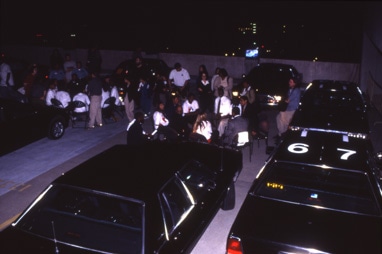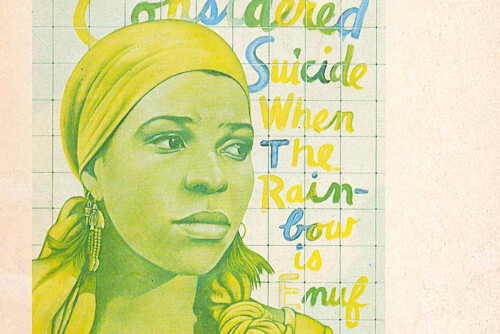American Racism 2.0
And that leadership is sorely needed. While it may be ironic that our first black President, who was able to mobilize the most impressive grassroots campaign in history, seems averse to open discussion of race or addressing the concerns of organized grassroots black rights organizations, a glimpse of this alienation was perhaps never more apparent than candidate Obama’s carefully phrased statements surrounding the events of the racially charged Jena Six incident in Louisiana, which led to some of the largest Civil Rights protests in the twenty-first century.
When six black high school students in Jena, Louisiana were arrested after a school fight with a white classmate who suffered a concussion and multiple bruises, they were charged with conspiracy, attempted second degree murder, and faced up to 100 years in prison without parole. The fight was the result of black students sitting under a tree that was typically occupied by the white students; the following morning three nooses were found hanging from a tree. Ensuing tensions led to the confrontation.
Before the mainstream media picked up the story, it simmered for months in the online sphere of African-American bloggers, eventually leading to signed petitions and the largest organized Civil Rights protests in years. The tradition of anti-racist activism had now made the leap to the twenty-first century, empowered by social media as Reverand Al Sharpton noted, “Ten years ago this couldn’t have happened…. You didn’t have the Internet and you didn’t have black blogs and you didn’t have national radio shows. Now we can talk to all of black America every day.”
Fellow Democratic candidate, Senator Hillary Clinton, speaking out on the case at an NAACP banquet in North Charleston, South Carolina, forcefully said that “scales of justice are seriously out of balance for black Americans,” and that, “There is no excuse for the way the legal system treated those young people.”
In sharp contrast, Senator Obama released a maddeningly reductive statement that “Outrage over an injustice like the Jena 6 isn’t a matter of black and white. It’s a matter of right and wrong.”
By effectively sidestepping the issue of race at the heart of the incident, Obama demonstrated a willingness to put the tactical considerations of his campaign over progress for racial justice in this nation, a theme that continues through the policies and appointments of his current administration. At the time, Jesse Jackson accused Obama of “acting like he’s white,” and it was a group of African-Americans who openly heckled candidate Obama at an appearance in South Florida, holding aloft a banner “What About the Black Community Obama?”
And there’s good cause for concern. A closer examination of Senator Obama’s campaign reveals the underlying reasons that President Obama doesn’t address issues of race. In a February 2008 article on the Huffington Post, Jeff Chang writes:
One quote should raise worries. Here’s his top advisor, David Axelrod, who seems to suggest that the campaign still views even African-Americans more as emergent—useful for votes and campaign donations—than insurgent—needing to be considered carefully in agenda discussions. “He believes you can have the support of the black community, appealing to the pride they feel in his candidacy, and still win support among whites,” Mr. Axelrod said.
In essence, President Obama doesn’t have to provide leadership on issues of race because he believes he can take the support of African-Americans for granted, and distancing himself from the language and history of Civil Rights activism in fact makes him more appealing to white voters who can only tolerate a “post-racial” President. It is the fear of losing the white voter that explains Obama’s curious distance from the black community in general, and black women in particular. This fear explains why the Obama administration can’t possibly appoint, or seriously consider, a qualified black woman for a Supreme Court nomination. And it explains why his administration is so quick to demand the resignations of black women at the faintest hint of failure or scandal. Obama’s success is so tied to the white voter that during his campaign, he was reluctant to make even Michelle a central figure. It was his black advisors who pushed strongly for her inclusion: “It took Barack a while to agree, [b]ut we told him she had to be the one to confront the myths and fears of black voters.”
The fact that the President himself couldn’t confront the myths and fears of black voters speaks volumes. Perhaps he feels that America isn’t ready to engage publicly in the kinds of conversations necessary to resolve racism, that he’s pushing the boundary as far as he can just by occupying the Oval Office, and that by creating a more diverse staff at a lower level, less influential positions in his administration, there will be a gradual move towards diversifying higher levels of power. But he should take note of history when it comes to failing to address racial injustice in a substantive way. When African-American communities feel alienated, they organize and create their own power base; it was this alienation that led to the Civil Rights movement in the 60s, it led to the creation of the National Black Feminist Movement in 1973, and it has led in 2008 to the creation of a new initiative that will, for the first time in history, grade presidential administrations on how their practices and policies affect African-Americans.
Presidential Accountability Commission and Looking Ahead
In 2008, at its State of the Black World Conference in New Orleans, the Institute of the Black World 21st Century (IBW) announced a new initiative: the Shirley Chisholm Presidential Accountability Commission (SCPAC), named in honor of the first black woman elected to Congress and the first black woman to seek the Democratic nomination for President. The Commission’s members will grade presidential administrations on how their practices and policies affect African-Americans. The Commission is comprised of 11 members, including Syracuse University professor Dr. Boyce Watkins, and Dr. Julianne Malveaux, President of Bennett College for Women. Said Richard Adams, Chairman of the Board of IBW and Convener of the Commission:
The Shirley Chisholm Accountability Commission was not organized to react to President Barack Obama. As we indicated when the idea of the Commission was announced at the State of the Black World Conference, we need a mechanism that can monitor progress on the Black Agenda, no matter who occupies the White House. We finally have a structure that can fulfill that function in Black America. 1
Of course, because of timing, the Obama administration will be the first to receive a grade from the Commission. In October 2009, talking to Essence.com, Dr. Malveaux shared a story of Franklin D. Roosevelt telling civil rights leader A. Philip Randolph and other black leaders concerned about jobs for African-Americans to “raise enough hell” so that Roosevelt had no choice but to address their needs. 2 She related the anecdote to the Commission and Obama: “He’s our brother, and he gets it, but we’re not his only constituency. He’s not the President of Black America. We have to make him do right. He’s not going to do right just ’cause. We’ve got to make him.” 3
In full disclosure, I am also a member of the Commission. It is our hope that the work of the Commission and letters like that of the Black Women’s Roundtable will begin the hell-raising that needs to be done in order to get President Obama’s attention, force him to address race, and compel him to create policies that clearly assist African-Americans. On June 18, 2010, the inaugural meeting of the Commission was held, featuring a discussion entitled, “Black America: The Economic State of Emergency,” in which the problem of joblessness and unemployment in African-American communities was addressed. An issue that sadly, has not been covered by any major media outlet, championed by any presidential appointee, or even mentioned by the President himself.
- Faye Anderson, “Shirley Chisholm Presidential Accountability Commission Launched,” Anderson@Large, 18 June 2010.[↑]
- “Dr. Julianne Malveaux on President Obama,” Essence.com, 15 October 2009.[↑]
- Essence.com.[↑]



